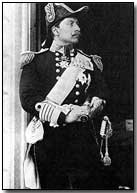Primary Documents - Kaiser Wilhelm II's Appointment of Prince Max von Baden as Chancellor, 28 October 1918
 In the wake of the Allied
resurgence in the summer and autumn of 1918 - with the breaking of the
Hindenburg Line in Flanders and in the Argonne - and with the sudden
collapse of its own allies - the German High Command came to the conclusion
that the war could not be won.
In the wake of the Allied
resurgence in the summer and autumn of 1918 - with the breaking of the
Hindenburg Line in Flanders and in the Argonne - and with the sudden
collapse of its own allies - the German High Command came to the conclusion
that the war could not be won.
Consequently it recommended to a stunned Reichstag on 2 October 1918 that a peace with the Entente powers be negotiated, a message that was reiterated by Army Chief of Staff Paul von Hindenburg on the following day. Kaiser Wilhelm II, sensing defeat, appealed on 6 October to the army to maintain their resolve in their "grave" hour, a call he subsequently repeated with greater urgency four days later.
As the month drew to a close and with the German public growing increasingly restless - revolution was less than two weeks away - the Kaiser appointed a new, reformist Chancellor, Prince Max von Baden, along with a more representative government. He also freed numerous political prisoners, including Dr Karl Liebknecht who promptly called for a revolution.
Hindenburg - now without Erich Ludendorff who had resigned his position - contacted the Allied Supreme Commander Ferdinand Foch to open armistice negotiations on 7 November; the armistice was agreed four days later, by which time the Kaiser had been obliged to abdicate.
Reproduced below is the text of the Kaiser's proclamation to von Baden announcing a form of representative government on 28 October 1918.
Kaiser Wilhelm II's Proclamation to Chancellor Prince Max von Baden, 28 October 1918
Your Grand Ducal Highness:
I return herewith for immediate publication the bill to amend the Imperial Constitution and the law of March 17, 1870, relative to the representation of the Imperial Chancellor, which has been laid before me for signature.
On the occasion of this step, which is so momentous for the future history of the German people, I have a desire to give expression to my feelings. Prepared for by a series of Government acts, a new order comes into force which transfers the fundamental rights of the Kaiser's person to the people.
Thus comes to a close a period which will stand in honour before the eyes of future generations. Despite all struggles between invested authority and aspiring forces, it has rendered possible to our people that tremendous development which imperishably revealed itself in the wonderful achievements of this war.
In the terrible storms of the four years of war, however, old forms have been broken up, not to leave their ruins behind but to make a place for new, vital forms.
After the achievements of these times, the German people can claim that no right which may guarantee a free and happy future shall be withheld from them.
The proposals of the Allied Governments which are now adopted and extended owe their origin to this conviction. I, however, with my exalted allies, endorse these decisions of Parliament in firm determination, so far as I am concerned, to cooperate in their full development, convinced that I am thereby promoting the weal of the German people.
The Kaiser's office is one of service to the people. May, then, the new order release all the good powers which our people need in order to support the trials which are hanging over the empire and with a firm step win a bright future from the gloom of the present.
WILHELM, I. R.
(Countersigned.)
Max, Prince of Baden
Source: Source Records of the Great War, Vol. VI, ed. Charles F. Horne, National Alumni 1923
German losses at Messines were 25,000, of which 7,500 were taken prisoner. British casualties were 17,000 killed or wounded.
- Did you know?
